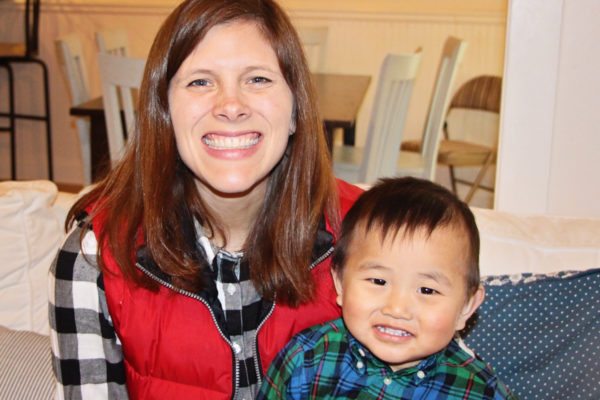The long wait is over. After more than a year or two of dreaming, planning, and preparing for your child, there he or she sits at your table. The paperwork is done. The trip overseas is completed and now the real journey begins.
Far too often this new adventure develops quickly into something many adoptive parents experience but are unwilling to share. The first few months home can set the stage for the perfect storm of post-adoption depression.
First there is jet lag. Sleep deprivation has long been used as a form of actual torture so not getting enough sleep is no joke. Even after you and your child recover from jet leg, it is often difficult for a newly adopted child to feel safe enough in his or her environment to sleep, so naps or continuous rest at bedtime may be unsuccessful or short. Lack of sleep causes trouble concentrating, weight and mood changes, irritability, and increased heart rate among other problems. Exhaustion reduces your emotional capacity to handle all other tasks of the day making simple chores like folding laundry, washing dishes, and preparing a meal feel like a mountain too difficult to climb.
I can identify with this because our own little one was waking up every single hour of the night after 11:00 p.m. for the first month and only wanted to be comforted by me. No matter how joyful I was about our adoption, there is no doubt that I felt like I was in a complete fog.
Next add in a child who does not know the language. Trying to understand what your child wants is a game of charades that is fun for only so long. Communication becomes difficult when you are talking to an exhausted toddler who is also experiencing extreme culture shock. This results in temper tantrums and sometimes prolonged periods of crying because your child isn’t able to communicate with you. Even though we taught our son some sign language so we could try to head off this issue, he still has moments of complete meltdowns when he is frustrated because we cannot understand what he wants.
Then weave in loneliness. The adoption community advises a period of cocooning or hunkering down for a few months. This is an incredibly important time for your child of making his or her world feel safe, small, and predictable. However, staying home day after day can make any parent feel lonely and stir crazy when he or she is used to a lot of social interaction outside of the house. Adoption experts also advise that parents should be the only ones to feed, change, hold, and comfort the child which eliminates outside help from relatives and friends. This trains the child that the parents are the primary caregivers and there is no confusion to the child of who will take care of him or her. This is such an imperative practice, but it is also hard when a parent needs a break and is unable to take one. As an introvert, I need long periods of quiet and alone time to recharge. This is difficult when I am needed all day every day.
Also factor in that you are attempting to bond with someone you only just met, and who might not reciprocate those feelings of love back to you. Adoptive parents have sometimes spent years planning and praying for their child. The child, however, often has no foreknowledge of the adoption and is simply taken one day from everything he or she has ever known and placed in the arms of complete strangers. It isn’t easy leaning in for a kiss while your child is simultaneously swatting you across the face. Children in orphanages may bite and hit out of survival and it is often hard for them to transition out of those learned behaviors when they get to their forever home. The first few weeks we had our son, he would give us hugs one moment and then hit us the very next second. I could tell he wanted to trust us and yet was not sure if we were safe. It was obvious he was using an institutional behavior out of protection and instinct.
Add in a loss of power and control. There is no text book answer for adopting a special needs child. Every adoption is different and predictability and ease are not two words I would associate with adopting a child from an orphanage.
Then there is the self-imposed pressure to continue to be the best spouse, parent, and friend you can to those who were with you before this child came into your life.
So the perfect storm of exhaustion, lack of communication, loneliness, feelings that may not be reciprocated, loss of control, and self induced pressure often results in post adoption depression.
However, this storm is not intended to be weathered alone. One of Jesus’ most precious gifts to us is how He uses relationships to impact and grow our faith.
The first step is talking about your feelings with someone. I just made an appointment with a counselor. It’s not because I am crazy, but instead I know that I want to be the most emotionally healthy version of myself I can be. Counseling is not a sign of weakness; it is a sign of strength. It helps avoid the crisis before it starts and gives parents like me an outlet to talk through their new normal. Hiding our emotions can bring shame and defeat but bringing these feelings out in the open breaks their power and paves the path to healing and hope.
Accepting help from others is another way to break free from post-adoption depression. My new word in this season when people offer to help is “yes!” Yes to dinner delivered to my house by a friend. Yes to a neighbor watching my other children. Yes to someone coming to clean my home. Yes to a gift card to a restaurant. Yes to someone offering to pick up an item from the store. Yes to help with laundry. Yes to grocery store services like Kroger ClickList. Yes, yes, yes!
On the flip side I have also gotten really good with the word, “no.” I recognize in this season of finding my new normal that my emotional capacity is not what it used to be. It is okay to say no right now to tasks that feel overwhelming to me like coordinating a school party, organizing a neighborhood event, or scheduling snacks for my son’s basketball team. It is fine to pass on those items for a season. There will be a time and a place for adding them back in another day.
Also, community is vital in this time but it may look different than it did pre-adoption. Maybe I can’t grab coffee with a friend during the day, but I can invite her to take a walk with me while I push my son in a stroller. Maybe I can’t talk on the phone uninterrupted, but I can download an app like Voxer which allows me to “talk” to my friends on my own time. Maybe I have to wait until after my son falls asleep to hang out with friends. Whatever it looks like, I would encourage you to make it happen because you need time away to be refreshed. If those friends happen to be adoptive moms like you, even better. You need to surround yourself with people who understand this road and can encourage you along the way.
In time, the sleep will come.
After a while your child will start to learn the language.
You will eventually be able to open up your social circle and allow for playdates and story time outings and the loneliness will fade.
The kisses and hugs will one day be there and the hitting will hopefully stop.
But I can’t promise power and control. God never meant for us to be in control. Instead we rely on Him for strength and relinquish the pressures we were never meant to carry.

The rhythm of your new normal will become a beautiful symphony in your home. But in the meantime don’t sit in the dark cloud of post-adoption depression. Admitting that you may have gotten caught in the storm is the beginning of the sun.


























Thank you for sharing, Courtney. Very helpful and well written!